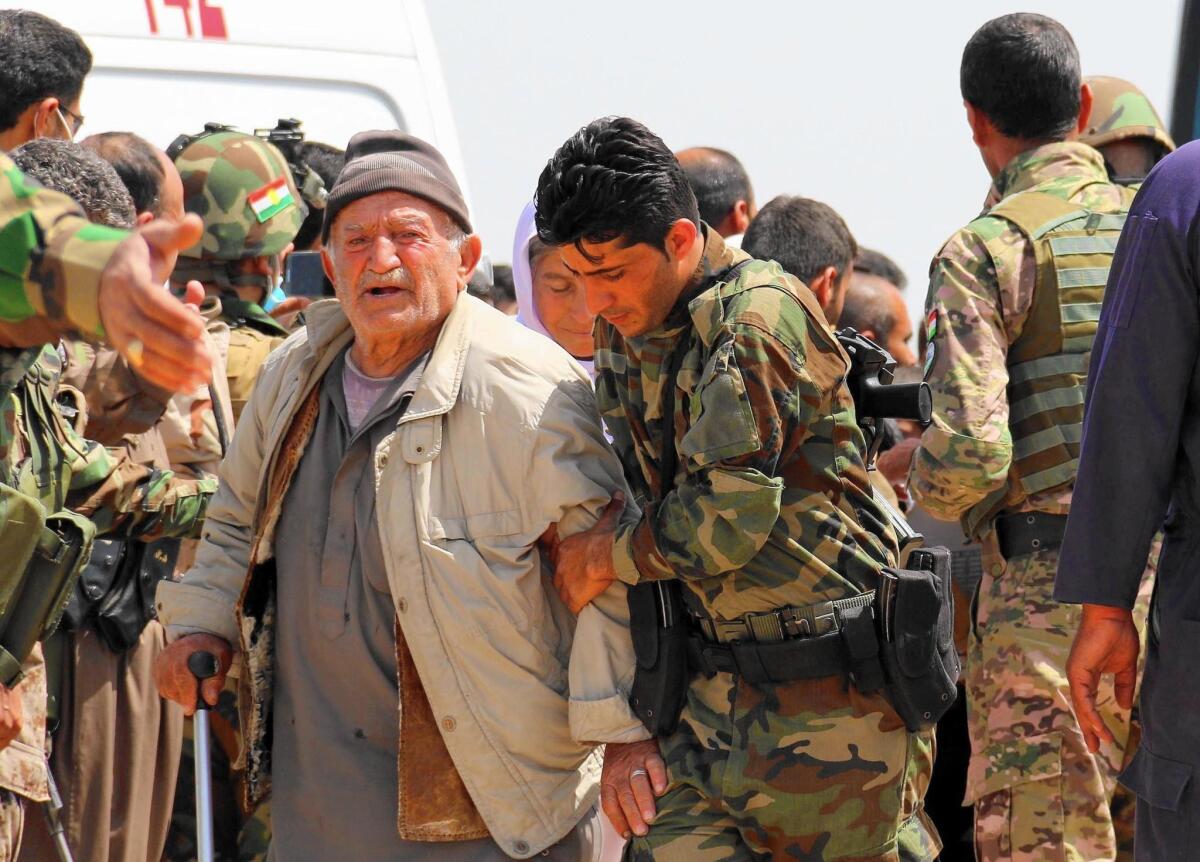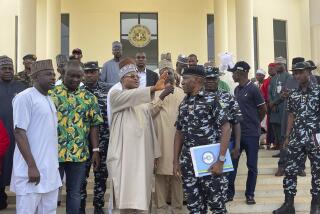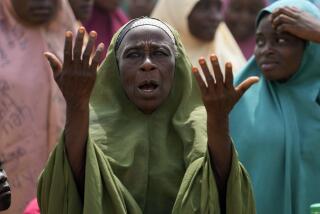200 abducted Yazidis released by Islamic State in northern Iraq

More than 200 Yazidis abducted by Islamic State in August were released Wednesday, Iraqi government officials said, in what was characterized as a rare act of goodwill by the violent extremist group.
Vian Dakhil, an Iraqi parliament member, confirmed that 217 Yazidis, including 60 children, had arrived in Kirkuk province.
“I am now with them, and seeing what medical and food assistance they require,” she said. Most of those released were elderly or disabled.
The announcement came as Islamic State reportedly suffered setbacks in a Palestinian refugee camp outside Damascus, the Syrian capital, where its fighters have been under siege by Palestinian factions and Syrian government bombardment.
In August, Dakhil, who is Yazidi, issued a tearful call to the international community to save hundreds of her compatriots abducted by Islamic State militants. The Yazidis are followers of an ancient faith linked to Zoroastrianism but viewed as satanic by Islamic State, which has claimed a vast area of Iraq and Syria in the name of an Islamic “caliphate.”
Those who managed to escape found themselves besieged by Islamic State atop Mt. Sinjar, in Iraq’s northwest, prompting the U.S. to initiate a massive airlift to rescue them.
Many Yazidis remain missing, however. Soon after seizing them, Islamic State issued a series of edicts, backed by religious texts, explaining that Yazidis could be used as slaves. Reports soon appeared of Yazidi women taken to Islamic State strongholds in Mosul, 70 miles east of Mt. Sinjar, and across the border to Raqqah in neighboring Syria.
Hassan Omar, a spokesman for Dakhil, said those released had come from the town of Tall Afar, 39 miles west of Mosul. He said the captives had been released by local Arab tribesmen.
“We don’t have solid information, but we heard this was a goodwill gesture from Islamic State to the [Sunni] tribes,” he said.
Tension has risen in Iraq’s northern regions in the last year as a result of Islamic State’s deliberate and systematic targeting of minorities, including Kurds, Yazidis and Christians. Islamic State espouses a harsh interpretation of Sunni Islam.
Palestinians based in the Yarmouk refugee camp, about four miles south of central Damascus, are among those who have fallen under Islamic State control recently. However, Palestinian factions said Wednesday that they had flushed out the militants from key areas of the camp.
“Much of the camp is still in the hands of the gangs of Daesh, but we liberated roughly 35-40%,” said Abu Kifah, a field commander with a splinter group, the Popular Front for the Liberation of Palestine-General Command. He spoke by phone from Yarmouk. Daesh is the Arabic acronym for Islamic State.
Reports two days earlier said the camp had nearly fallen into the hands of Islamic State, which launched a campaign to seize Yarmouk last week.
The situation in Yarmouk, already a symbol of suffering and deprivation as a result of the Syrian civil war, has become even more dire in this latest round of fighting. United Nations officials say 18,000 Palestinians and Syrians are trapped in the camp without access to food, water and basic medical care.
The fighting has pushed hundreds of civilians to flee Yarmouk in the last week, further whittling down the camp’s population from its prewar height of a quarter of a million. The U.N. said 94 residents had fled Wednesday.
The Syrian government has remained largely on the sidelines of the clashes in the camp, which is under the jurisdiction of the Palestine Liberation Organization and various Palestinian factions. On Wednesday, however, Lebanese broadcaster Al Mayadeen reported that Syrian army units shelled Islamic State fighters in Yarmouk and surrounding areas.
At a news conference in Damascus, Palestinian and Syrian officials hinted at a greater military role for the Syrian army in the coming days.
Ahmad Majdalani, a member of the PLO executive committee, said that the presence of Islamic State in the camp “created a new reality,” and that he had discussed the role of the Syrian government and “its responsibility in preserving the security of its lands and protecting its citizens, whether they are Palestinians or Syrians,” according to the Syrian state news agency SANA.
He also said that “it has become very difficult now to speak of the possibility of a political solution” that would empty the camp of arms.
His comments were echoed by Syrian Reconciliation Minister Ali Haidar, who spoke of the “necessity” of military action in the camp to prevent the creation of a “weak link” in Damascus.
“The Syrian government does not choose the military solution, but instead those who entered the camp and destroyed all that we had achieved ... must bear responsibility,” he said.
Bulos is a special correspondent.
More to Read
Start your day right
Sign up for Essential California for news, features and recommendations from the L.A. Times and beyond in your inbox six days a week.
You may occasionally receive promotional content from the Los Angeles Times.







